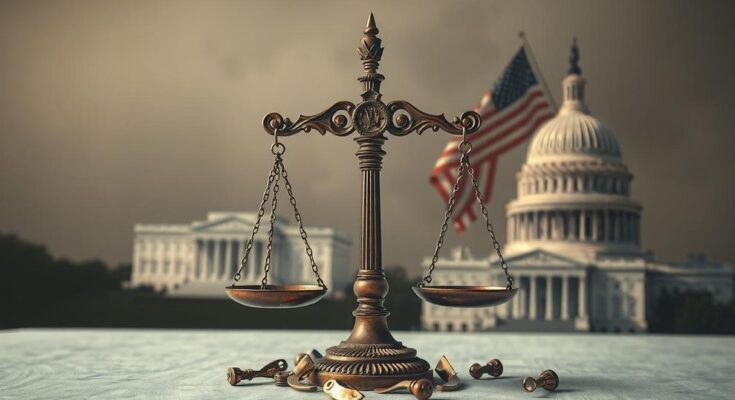Prominent Nigerians, including Obasanjo and Kukah, expressed concerns over the decline of democracy in Nigeria at a colloquium for Emeka Ihedioha’s 60th birthday. Kukah critiqued the selective nature of democratic benefits, while Obi contested the notion of progress, asserting a regression instead. Anyaoku called for a constitutional review for better governance, whereas Abbas highlighted ongoing democratic growth despite challenges.
On Monday, several distinguished Nigerians, including former governors and public officials, expressed concerns regarding the deteriorating state of democracy in Nigeria during a colloquium in Abuja commemorating Emeka Ihedioha’s 60th birthday, chaired by former President Olusegun Obasanjo. Among the attendees were notable figures such as Emeka Anyaoku, Atiku Abubakar, Peter Obi, Aminu Tambuwal, and Aminu Masari.
In his keynote address, Catholic Bishop Matthew Kukah questioned the efficacy of Nigeria’s democracy, suggesting that it primarily serves a select few. He emphasized the pressures on the judiciary and advocated for a critical examination of the Nigerian Constitution, highlighting the discrepancy between democratic principles in Africa compared to other regions, particularly Asia.
Kukah pointed out, “There was pressure on judges to deliver justice,” stressing the urgent need for reform and accountability within the democratic framework. He also encouraged politicians to learn from the tumultuous relationship between Obasanjo and Atiku, which he likened to a resilient marriage that survives conflict while maintaining unity.
Conversely, Peter Obi contested Kukah’s view that democracy remains a work in progress, reflecting on the initiatives undertaken since 1999 aimed at enhancing Nigeria’s democratic standards. Obi lamented, “Everything has been knocked down. Nothing works,” illustrating his belief that democratic processes have significantly regressed.
Additionally, Obi shared his experiences during his impeachment as Anambra governor, recalling the support he received from leaders, including Obasanjo, in stark contrast to current political dynamics, underscoring a perceived failure of democracy.
Obasanjo criticized contemporary political practices in Africa, characterizing them as mere ‘representative democracy,’ which fails to encapsulate the essence of governance intended for the populace. He remarked, “Democracy has failed because it is not African,” calling for a re-contextualization of democratic principles to align with African culture and realities.
Atiku Abubakar reflected on the sacrifices many leaders made for the establishment of democracy, acknowledging Kukah’s call for loyalty and dedication among political figures, regardless of party affiliations. Aminu Tambuwal, while condemning the recent state of emergency declared in Rivers State, advocated for adherence to democratic institutions and rules, emphasizing that Nigeria’s future hinges on collective responsibility in governance.
Emeka Anyaoku, the former Commonwealth Secretary-General, proposed a thorough review of the 1999 Constitution to address ongoing structural challenges, insisting that true federalism is essential for national governance. He stated, “It is only true, stable democratic governance that can rid our country of the crises which impede development.”
In contrast, Tajudeen Abbas, Speaker of the House of Representatives, acknowledged challenges yet asserted that Nigeria has made significant strides in democracy, asserting that “democracy has come to stay in Africa and indeed Nigeria,” while calling for reflection on the value that democracy adds to societal development.
The colloquium highlighted widespread concerns regarding the decline of democratic standards in Nigeria, with prominent figures articulating differing perspectives on the nation’s political trajectory. While some, like Kukah and Obi, characterized democracy as failing, others, including Abbas, remained cautiously optimistic about its future. The discussions underscored the need for reforms, constitutional review, and a collective approach to strengthen democratic processes across Nigeria.
Original Source: punchng.com




